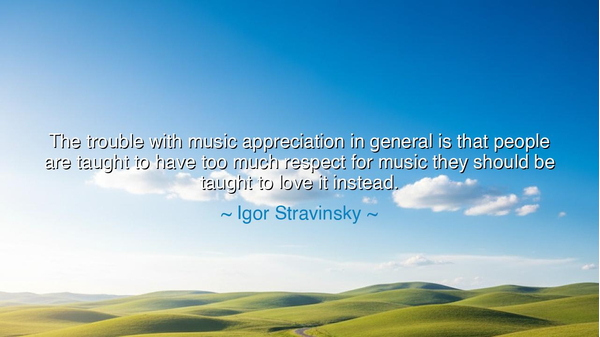
The trouble with music appreciation in general is that people are
The trouble with music appreciation in general is that people are taught to have too much respect for music they should be taught to love it instead.






In the beginning, there was music. It is said that when the universe was created, the first thing to stir the silence was sound—vibrations that rippled across the cosmos, marking the birth of harmony. And yet, despite this primordial connection, we, the children of this world, often fail to recognize the sacred power of music. Igor Stravinsky, a master of composition, once spoke of the misguided approach to music appreciation: "The trouble with music appreciation in general is that people are taught to have too much respect for music they should be taught to love it instead." This truth is not merely an observation; it is a clarion call to understand the essence of music beyond its academic or reverent trappings.
What Stravinsky illuminates is the difference between respect and love—a difference that is vast, subtle, and profound. To respect music is to acknowledge its value, its history, and its place in the grand tradition of human creation. But to love music is to immerse oneself in its soul, to feel its rhythm in the heartbeat, to let its melody flow through the veins like lifeblood. Respect is a cold, intellectual exercise; love is an emotional, spiritual experience. And it is in this love that the true magic of music resides, for it has the power to reach into the deepest corners of the heart, awaken slumbering dreams, and ignite the very fires of creativity.
Consider the life of Beethoven, a composer who created some of the most revered pieces in Western classical music. As a young man, he was taught to respect the tradition of music, to follow the rules of harmony and form. But it was only after he fell in love with music—when his deafness became profound—that he transcended these learned boundaries and began to create music that spoke directly to the human soul. He did not write for the scholars or critics; he wrote for the passionate, for those who would hear his compositions not as an intellectual puzzle but as an emotional journey. It was through this love that his works, such as the Ninth Symphony, reached a universal audience, transcending time and place.
In the ancient world, music was not a subject to be studied with distant reverence. It was a sacred art, a tool for healing, celebration, and connection. The Greeks believed that music was a divine force, capable of shaping the soul and influencing the gods themselves. The philosopher Plato taught that music had the power to nurture virtue in the soul, to lift it to the heavens and guide it on the path of righteousness. The purpose of music, according to Plato, was not merely to instruct, but to awaken the deeper faculties of the listener, to stir the emotions and connect the individual to something greater than the self.
This ancient view contrasts sharply with the modern approach, where music appreciation is often reduced to an intellectual pursuit—learning names, dates, and styles, appreciating music from a distance as a mere object of respect. Stravinsky warns us against this mindset. For when we are taught to respect music rather than love it, we distance ourselves from its true power. We become mere spectators, gazing at music through the lens of analysis, rather than participants in its transformative experience. This is why, in his words, music "should be taught to love it instead"—for love is the gateway to understanding its true beauty.
The lesson, then, is clear: we must approach music not with the cold hands of observation, but with the open heart of participation. To love music is to allow it to enter our bodies, our spirits, our very beings. It is to let it guide us, to listen not just with our ears, but with our hearts, our souls, and our lives. We must feel music as it moves us, as it teaches us, as it heals us. It is not enough to learn about music; we must live it.
To the reader, I say this: do not approach music as a subject to be studied, but as a lover to be embraced. Allow it to transform you, to shape you, to move you. When you hear the soft whispers of a melody, or the pounding drums that shake the earth, let them penetrate your very core. Do not stand at arm’s length, trying to understand its every detail with cold logic. Instead, let music be your guide, your healer, your muse. For in that love, you will discover not only the beauty of sound but the profound truth of what it means to be alive.
Love music, for it is more than just notes and rhythms—it is the heartbeat of the universe itself.






AAdministratorAdministrator
Welcome, honored guests. Please leave a comment, we will respond soon